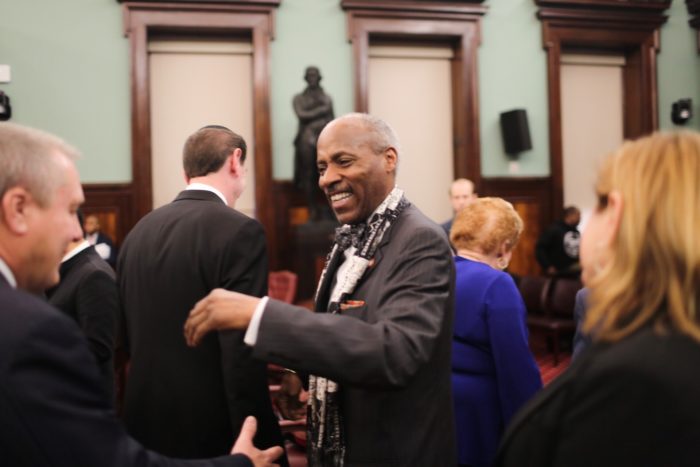
William Alatriste for the NYC Council
Incumbent Bill Perkins won about 50 percent of the vote in the September 12 democratic primary.
The participatory budgeting program gives constituents an opportunity to vote for capital improvement projects in their district. It has grown immensely popular since it was first launched in four Council districts in 2011: Now 31 of the city’s 51 councilmembers, from all five boroughs, take part in the program.
It works like this: Councilmembers agree to set aside $1 million or more of their discretionary funds to the program. Anyone proposes an idea—now collected on an online Idea Collection Map—and volunteers from the district narrow down the proposals and work with city agencies to develop a concrete list to be placed on a ballot. Volunteer poll workers operate voting sites during “Vote Week” in the spring, which are open to any voter at least 11-years-old or at least in 6th grade who lives in the district. Almost 103,000 New Yorkers voted in the 2016 budget cycle; some winning projects included air conditioning for Inwood schools and NYPD cameras in the Bronx.
Advocates of the program say it heightens political engagement, especially in underserved communities. In 2015, Gotham Gazette cited sources that said 60 percent of voters were people of color and 30 percent made incomes of under $25,000—pretty in line with the city’s actual make-up. Another one in 10 participants were under 18, and a quarter were born outside the United States.
Skeptics of the program, however, argue that participatory budgeting can take a lot of time and energy that many busy constituents might not have to waste, and that ultimately it is a pro-forma exercise, determining less than one percent of the entire city budget.
Like it or not, Harlem, District 9, has never participated. Assemblymember Inez Dickens, who served as the councilmember for District 9 from 2006 until her resignation this February, thought it was unnecessary. A press secretary for Dickens told Gotham Gazette that community boards are the “collective voice of the community” and that “their expressed views on the capital projects that need funding provide a significant input on what needs must be addressed.”
Dicken’s successor, Bill Perkins, took office in February and did not participate this year—which is not surprising, since the process requires months of preparation. But asked by challenger Tyson-Lord Gray at a debate in August why he hadn’t participated, Perkins insisted that he had done so during his prior term in the council:
“I subscribe thoroughly to that,” he said. “It opens the door of opportunity for their vision or their ideas to be part of that ultimate budget. Generally speaking, the community does not have that type of engagement and very often it’s left to those of us who are the insiders to make that kind of decision….”
Gray, who placed fourth in the September 12 primary that Perkins won, recently posted a video pointing out that Perkins’ earlier term in the Council—from 1998 to 2005—happened before the creation of the participatory budgeting program.
“Councilman Perkins LYING or CONFUSED…either way District 9 deserves better!” the video asserts. Gray is running on the Liberal party line in the general election.
Asked by City Limits to clarify his statement, Perkins at first contended he had participated in the program in the past. “The participatory budgeting program was around for years,” he said. After speaking with someone in his office, however, he said, “I must be mistaken then…For some reason I thought that we participated in this process in the past, and I have to double check.”
Gray says Perkins’ “confusion” is “the reason why Harlem needs new leadership,” and—noting problems like the affordability crisis, the high unemployment rate, the problems faced by tenants in Tenant Interim Lease buildings, and rats—he argues that “Harlem needs a city councilman who takes these issues seriously enough to be informed.”
Gray is a strong believer in the participatory budgeting program, which he says provides constituents with a “direct say” on the use of taxpayer dollars to address neighborhood issues, that it aims to “create grassroots democratic engagement and inspire civic participation,” and that politicians who decline to use it because they prefer to “return political favors or secur[e] future campaign contributions” are responsible for the era’s “mass disillusionment with politics.” Other primary participants at the August debate, including Cordell Cleare and Marvin Holland, also spoke in favor of the program.
It was unclear whether Perkins would participate in the coming year. Preparations for the spring vote have already begun in some Council districts.









One thought on “Factcheck: Has Councilmember Perkins Ever Participated in Participatory Budgeting?”
The history of District 9 politicians is to give the money to their friends and then get some of it back as a kick back. the same institutions get the money every year and no one knows how effective their programs are. They can bank on the fat that o one is going to do ay kind of in depth investigation to see how the money is used. The real problem is the fact that in New York, there is no opposition party and that is dangerous